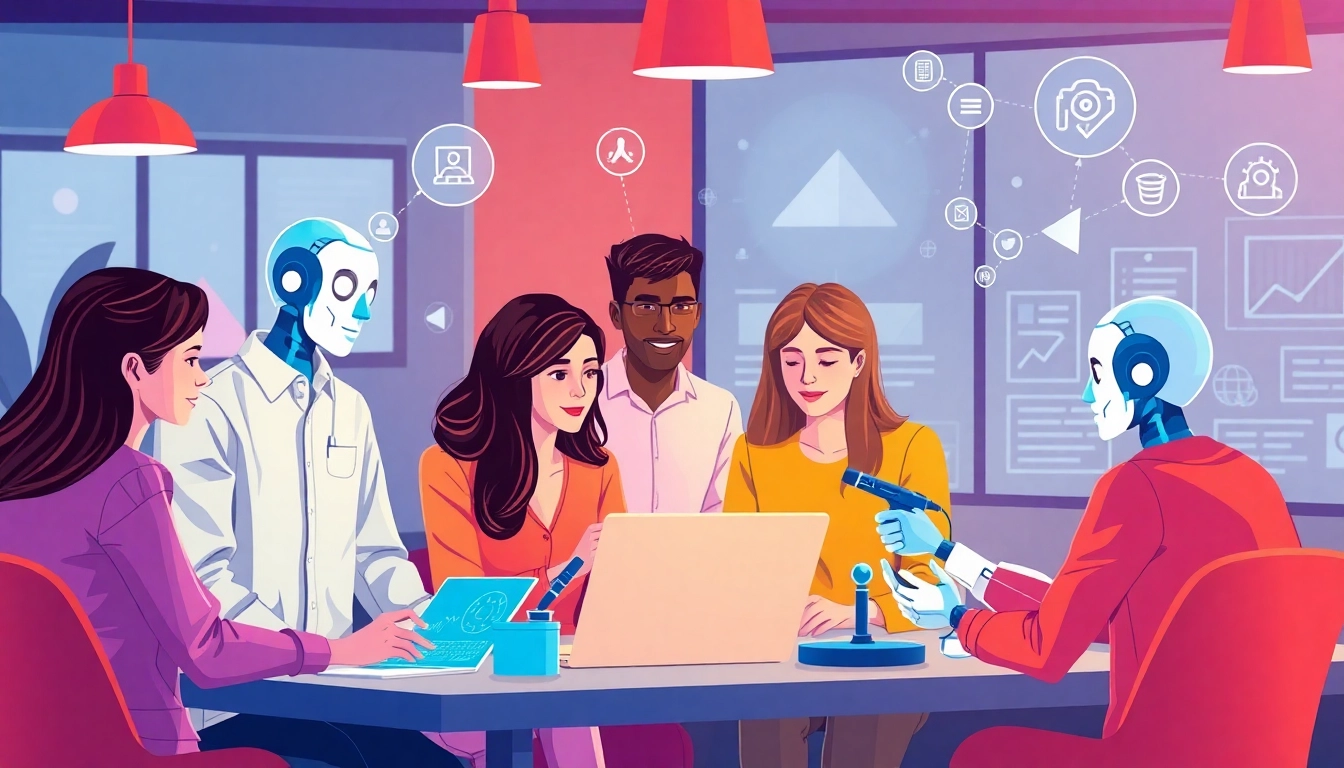Understanding AI Marketing Agents
What are AI Marketing Agents?
AI marketing agents are advanced software tools designed to automate specific marketing tasks through the utilization of artificial intelligence. These agents enhance productivity by streamlining processes such as customer segmentation, content personalization, and campaign optimization. While they operate with a degree of autonomy, successful implementation of these agents requires human oversight to ensure alignment with business goals and marketing strategies. By effectively integrating and leveraging AI marketing agents, businesses can enhance their overall marketing effectiveness.
How Do AI Marketing Agents Work?
The mechanics of AI marketing agents involve a sophisticated combination of algorithms, machine learning, and data analytics. Firstly, these agents collect and analyze vast amounts of data from various sources, including social media, customer interactions, and website analytics. Based on this data, they can recognize patterns and predict customer behavior, which allows marketers to tailor their campaigns more effectively.
AI marketing agents typically operate in several stages:
- Data Collection: They gather data from multiple channels, such as email marketing, social media interactions, and customer service queries.
- Data Analysis: Using machine learning algorithms, these agents process the data to identify trends and insights that can inform marketing decisions.
- Task Automation: Once they analyze the data, AI marketing agents can automate repetitive tasks—like sending emails or scheduling social media posts—allowing marketing teams to focus on strategic initiatives.
- Monitoring and Adjusting: AI agents continually monitor campaign performance, adjusting strategies in real time based on the results to improve outcomes.
Benefits of Using AI Marketing Agents
Implementing AI marketing agents offers numerous advantages, including:
- Increased Efficiency: Automation of tasks leads to faster execution and reduced workload for marketing teams.
- Enhanced Personalization: With sophisticated data analysis, AI marketing agents can customize messages and offers based on individual customer preferences, boosting engagement.
- Improved Decision-Making: Access to real-time data insights helps marketers make more informed decisions, maximizing ROI on campaigns.
- Cost Savings: By optimizing campaigns and minimizing manual tasks, businesses can reallocate resources more effectively.
- Scalability: AI marketing agents can easily scale initiatives across different marketing channels without significant additional costs or staffing needs.
Implementing AI Marketing Agents in Your Strategy
Choosing the Right Tools and Platforms
Selecting the appropriate AI marketing tools is crucial for effective implementation. Key considerations include:
- Compatibility: Ensure that the AI tools integrate seamlessly with existing marketing systems, such as CRM platforms or content management systems.
- Functionality: Look for features that align with your specific marketing needs, whether it’s social media management, email automation, or data analysis.
- User-Friendliness: A user-friendly interface allows teams to quickly adopt and utilize the software without extensive training.
- Vendor Support: Choose a provider that offers robust customer support and resources to assist in onboarding and troubleshooting.
Integrating AI Marketing Agents into Existing Workflows
Successful integration involves more than just installing software; it requires a strategic approach:
- Assess Current Processes: Identify aspects of your marketing strategy that could benefit from automation or enhancement through AI.
- Set Clear Objectives: Define what success looks like by establishing measurable objectives for your AI initiatives.
- Train Your Team: Ensure that staff members are knowledgeable about the new tools and understand how to leverage them for optimal results.
- Monitor Performance: Continuously track metrics and adjust strategies based on the insights drawn from AI analytics.
Common Pitfalls and How to Avoid Them
Even with promising technology, there are pitfalls that organizations may encounter when implementing AI marketing agents. These include:
- Over-Reliance on AI: While AI can enhance decision-making, it’s crucial to combine its insights with human intuition.
- Poor Data Quality: Inaccurate or incomplete data can lead to erroneous AI conclusions. Invest in data management practices to ensure high-quality inputs.
- Lack of Continuous Learning: Marketing landscapes evolve; ensure that AI systems are regularly updated with new data and learning techniques.
- Insufficient Change Management: Employees may resist new technology. Foster a culture that embraces innovation through training and open communication.
Best Practices for Optimizing AI Marketing Agents
Data Management and Quality Control
Effective data management is foundational for the success of AI marketing agents. To ensure quality control, consider the following:
- Implement Data Cleaning Processes: Regularly audit your data to remove duplicates, correct inaccuracies, and eliminate outdated information.
- Use Data Enrichment Services: Enhance your dataset by integrating external sources that provide additional insights about your target demographic.
- Establish Data Hygiene Protocols: Create guidelines for how data is collected, stored, accessed, and shared to maintain integrity.
Personalization Techniques Using AI
AI enables marketers to develop personalized experiences on a large scale. Techniques include:
- Dynamic Content: Customize web pages, emails, and advertisements based on user behavior and preferences.
- Segmentation: Use AI-enhanced insights to segment your audience more accurately for targeted campaigns.
- Predictive Analytics: Leverage historical data to predict future behaviors and tailor marketing messages accordingly.
Measuring Success and Performance Indicators
To evaluate the effectiveness of AI marketing agents, focus on performance indicators such as:
- Return on Investment (ROI): Measure the financial returns generated by campaigns enhanced by AI tools versus traditional methods.
- Conversion Rates: Analyze how AI-driven strategies impact customer journeys and lead conversion.
- Engagement Metrics: Track interactions and engagement levels on personalized content and campaigns powered by AI.
Future Trends in AI Marketing Agents
Emerging Technologies and Innovations
The future of AI marketing agents is poised for rapid evolution. Innovations to watch out for include:
- Natural Language Processing (NLP): AI agents that understand and generate human language will lead to more natural interactions in chatbots and content creation.
- Voice Search Optimization: As voice-activated devices become prevalent, AI agents will need to adapt marketing strategies to leverage voice search effectively.
- Augmented Reality (AR) and Virtual Reality (VR): Combining AI with AR/VR technologies will create immersive experiences that engage consumers on a deeper level.
Impact of AI on Consumer Behavior
The integration of AI marketing agents is fundamentally changing consumer behavior. Consumers now expect:
- Hyper-Personalized Experiences: Shoppers anticipate tailored recommendations that reflect their unique preferences and past interactions.
- Instantaneous Interactions: The demand for quick responses drives brands to utilize AI chatbots for customer engagement.
- Social Responsibility: AI enables brands to align their marketing efforts with socially responsible practices that resonate with modern consumers.
Staying Ahead of the Competition
To maintain a competitive advantage, marketers must embrace innovation through AI. Strategies include:
- Continuous Learning and Development: Invest in ongoing education for your marketing team on emerging AI trends and tools.
- Agile Marketing Practices: Adopt agile methodologies that allow your marketing team to quickly pivot strategies based on AI insights and market shifts.
- Regular Performance Reviews: Periodically assess the effectiveness of your AI marketing agents and pivot as necessary to stay ahead of industry trends.
Case Studies: Successful Implementation of AI Marketing Agents
Industry Leaders Utilizing AI
Many organizations have successfully integrated AI marketing agents to enhance their marketing strategies. For instance:
Coca-Cola utilizes AI to predict consumer preferences by analyzing vast datasets from social media and sales. This has led to highly targeted campaigns that resonate well with audiences.
Netflix employs AI algorithms to recommend content to users based on their viewing history, which has significantly increased viewer engagement and retention.
Lessons Learned from Successful Campaigns
The successes of these industry leaders provide valuable insights such as:
- Understanding your audience is critical; continually gather and analyze data to keep your AI agents informed.
- Start small with AI initiatives and gradually expand as you assess their impact.
- Ensure that the deployment of AI marketing agents is accompanied by sufficient human oversight to account for unexpected outcomes.
How Small Businesses Can Leverage AI Marketing Agents
Small businesses can also benefit from AI marketing agents. Strategies include:
- Utilizing Affordable AI Tools: Many cost-effective AI marketing solutions are tailored for small businesses, enabling them to enhance marketing without straining budgets.
- Focusing on Niche Markets: Use AI to identify and target specific customer segments that larger competitors might overlook.
- Building Customer Loyalty Programs: Implement AI-driven loyalty programs that reward customers based on their individual purchasing behaviors.



